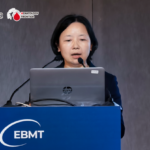
The 51st Annual Meeting of the European Society for Blood and Marrow Transplantation (EBMT 2025) was held from March 30 to April 2 in Florence, Italy. As one of the most influential international events in the field of hematology, the congress brought together more than 5,000 experts and scholars from around the world to discuss the latest advances in hematopoietic stem cell transplantation and cellular therapies.At this year’s meeting, the research team led by Professor Yang Cao from Tongji Hospital, Tongji Medical College, Huazhong University of Science and Technology, presented a study (Abstract OS8-06) that highlights the prognostic stratification value of KRAS mutations in KMT2A-rearranged acute myeloid leukemia (AML).During the congress, Hematology Frontier conducted an exclusive interview with Professor Cao, who shared insights into the key findings and clinical implications of the study, particularly its potential to guide optimal transplant timing and individualized treatment strategies.Prof. Yang Cao: KMT2A-rearranged acute myeloid leukemia (KMT2A-r AML), formerly known as MLL-rearranged AML, accounts for approximately 3% to 7% of newly diagnosed AML cases and represents a biologically and clinically distinct subtype. According to current risk stratification guidelines, all KMT2A fusion subtypes are categorized as adverse-risk, except for MLL-AF9 (KMT2A::MLLT3), which is considered intermediate-risk. However, effective treatment remains challenging, and this subtype is recognized as a persistent obstacle in leukemia management. Notably, the KMT2A gene can partner with over 130 different genes, and the impact of allogeneic hematopoietic stem cell transplantation (allo-HSCT) on outcomes in this context remains incompletely defined.
In this multicenter retrospective study, we collaborated with four leading institutions: Union Hospital, Tongji Medical College, Huazhong University of Science and Technology、Tongji Hospital, Tongji Medical College, Huazhong University of Science and Technology、Ruijin Hospital, Shanghai JiaoTong University School of Medicine, and Peking University People’s Hospital. Among 292 enrolled patients, we identified KRAS co-mutation as a key adverse prognostic factor in KMT2A-r AML. Patients harboring KRAS mutations exhibited significantly poorer overall survival compared to those with wild-type KRAS. These findings suggest that even in MLL-AF9 cases, traditionally classified as intermediate-risk, co-occurrence of KRAS mutations may warrant reclassification into the high-risk category—an important and novel insight into the impact of co-mutations on prognosis.
In patients achieving first complete remission (CR1), our results show that allo-HSCT can effectively mitigate the negative impact of KRAS mutations, supporting its role as a core therapeutic strategy in this population. Another key finding is that quantitative PCR-based MRD detection outperformed MFC-based MRD (flow cytometry) in predicting post-transplant outcomes. This has significant clinical implications: in refractory or high-risk patients, MRD-guided timing for transplantation, particularly using KMT2A-r-specific PCR, may lead to improved survival outcomes.
In the post-transplant setting, routine molecular monitoring and early intervention are essential for managing relapse risk. The introduction of novel molecularly targeted therapies, such as menin inhibitors, may provide new preventive strategies for post-HSCT relapse.
Additionally, our study revealed prognostic heterogeneity among different KMT2A partner genes. Patients with MLL-AF6 exhibited significantly poorer outcomes, while those with MLL-AF10 or MLL-AF4 require further stratification to refine prognosis and guide treatment.
Looking ahead, a multidimensional stratification system—integrating co-mutation profiles and fusion partner subtypes—will be essential to advance precision therapy for MLL-rearranged leukemia. With the clinical application of emerging targeted therapies like menin inhibitors and KRAS inhibitors, we anticipate further improvement in pre-transplant disease control and post-transplant survival. Ongoing prospective clinical trials are expected to provide high-level evidence to optimize therapeutic strategies for KMT2A-r AML.
Professor Yang Cao
Tongji Hospital, Tongji Medical College, Huazhong University of Science and Technology
Vice Chair of the Hematology Department and Chief Physician at Tongji Hospital, affiliated with Tongji Medical College of Huazhong University of Science and Technology.
- Member of the Hematological Oncology Group, Hematology Branch of the Chinese Medical Association
- Secretary of the Hematopoietic Stem Cell Transplantation and Cellular Immunotherapy Group, Hematologic Oncology Committee of the Chinese Anti-Cancer Association
- Chair of the Hematologic Oncology Group of the Hubei Anti-Cancer Association
- Vice Chair of the Hematopoietic Stem Cell Transplantation and Cellular Immunotherapy Group of the Hubei Anti-Cancer Association
Professor Cao specializes in basic and translational research on hematopoietic stem cell transplantation and cellular immunotherapy, as well as related clinical applications. She has served as principal investigator for multiple projects funded by the National Natural Science Foundation of China (NSFC), including general grants, youth grants, and major special projects supported by the Ministry of Education and other key national research programs such as the 973 and 863 programs.
She has published more than 20 peer-reviewed articles, with numerous first-author and corresponding-author publications in international SCI journals—including multiple papers in The Journal of Experimental Medicine (JEM).


